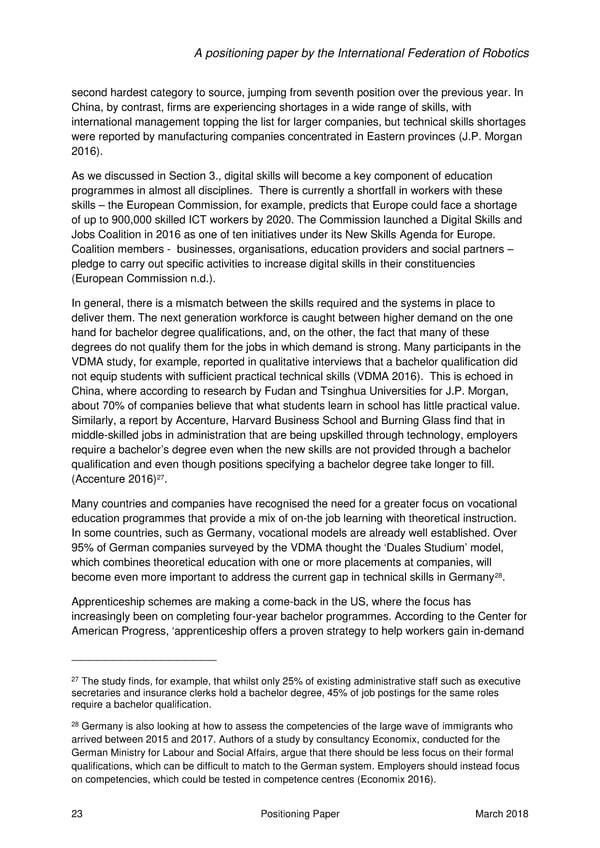A positioning paper by the International Federation of Robotics second hardest category to source, jumping from seventh position over the previous year. In China, by contrast, firms are experiencing shortages in a wide range of skills, with international management topping the list for larger companies, but technical skills shortages were reported by manufacturing companies concentrated in Eastern provinces (J.P. Morgan 2016). As we discussed in Section 3., digital skills will become a key component of education programmes in almost all disciplines. There is currently a shortfall in workers with these skills – the European Commission, for example, predicts that Europe could face a shortage of up to 900,000 skilled ICT workers by 2020. The Commission launched a Digital Skills and Jobs Coalition in 2016 as one of ten initiatives under its New Skills Agenda for Europe. Coalition members - businesses, organisations, education providers and social partners – pledge to carry out specific activities to increase digital skills in their constituencies (European Commission n.d.). In general, there is a mismatch between the skills required and the systems in place to deliver them. The next generation workforce is caught between higher demand on the one hand for bachelor degree qualifications, and, on the other, the fact that many of these degrees do not qualify them for the jobs in which demand is strong. Many participants in the VDMA study, for example, reported in qualitative interviews that a bachelor qualification did not equip students with sufficient practical technical skills (VDMA 2016). This is echoed in China, where according to research by Fudan and Tsinghua Universities for J.P. Morgan, about 70% of companies believe that what students learn in school has little practical value. Similarly, a report by Accenture, Harvard Business School and Burning Glass find that in middle-skilled jobs in administration that are being upskilled through technology, employers require a bachelor’s degree even when the new skills are not provided through a bachelor qualification and even though positions specifying a bachelor degree take longer to fill. (Accenture 2016)27. Many countries and companies have recognised the need for a greater focus on vocational education programmes that provide a mix of on-the job learning with theoretical instruction. In some countries, such as Germany, vocational models are already well established. Over 95% of German companies surveyed by the VDMA thought the ‘Duales Studium’ model, which combines theoretical education with one or more placements at companies, will become even more important to address the current gap in technical skills in Germany28. Apprenticeship schemes are making a come-back in the US, where the focus has increasingly been on completing four-year bachelor programmes. According to the Center for American Progress, ‘apprenticeship offers a proven strategy to help workers gain in-demand 27 The study finds, for example, that whilst only 25% of existing administrative staff such as executive secretaries and insurance clerks hold a bachelor degree, 45% of job postings for the same roles require a bachelor qualification. 28 Germany is also looking at how to assess the competencies of the large wave of immigrants who arrived between 2015 and 2017. Authors of a study by consultancy Economix, conducted for the German Ministry for Labour and Social Affairs, argue that there should be less focus on their formal qualifications, which can be difficult to match to the German system. Employers should instead focus on competencies, which could be tested in competence centres (Economix 2016). 23 Positioning Paper March 2018
 Robots & the Workplace of the Future Page 23 Page 25
Robots & the Workplace of the Future Page 23 Page 25